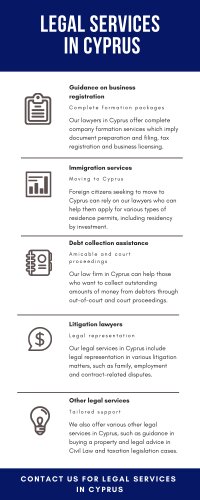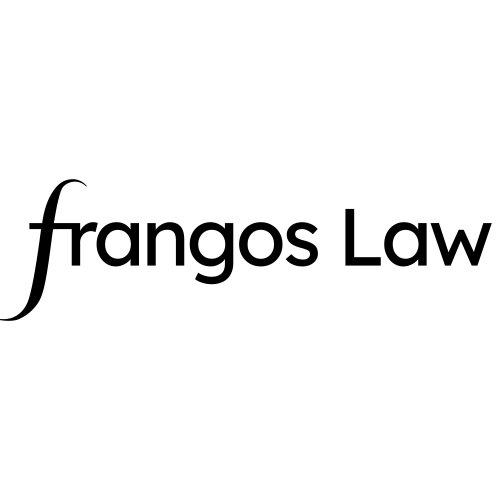Best Citizenship Lawyers in Larnaca
Share your needs with us, get contacted by law firms.
Free. Takes 2 min.
List of the best lawyers in Larnaca, Cyprus
About Citizenship Law in Larnaca, Cyprus
Citizenship in Larnaca, Cyprus, is governed by national laws that determine how individuals can acquire, retain, or lose Cypriot nationality. These laws are designed to manage the rights and responsibilities of citizens and facilitate the integration of immigrants into Cypriot society. Cyprus offers citizenship through birth, descent, marriage, and naturalization, providing various pathways for individuals seeking to become Cypriot citizens.
Why You May Need a Lawyer
Seeking a lawyer when dealing with citizenship issues in Larnaca, Cyprus, can be crucial due to the complexity of the legal processes involved. Common situations where legal assistance may be required include:
- Applying for naturalization or citizenship by investment - Dealing with residency requirements and work permits - Addressing issues related to dual citizenship - Handling legal disputes or challenges related to citizenship status - Navigating the legal implications of marriage or civil partnerships - Assisting with documentation and legal compliance for descendants seeking citizenship
Local Laws Overview
Key aspects of local laws relevant to citizenship in Larnaca, Cyprus include:
- **Naturalization**: Requirements include continuous legal residency in Cyprus for at least seven years, knowledge of Greek or Turkish, and integration into Cypriot society. - **Citizenship by Investment**: Requires significant investment in the Cypriot economy, such as real estate or business ventures. - **Birthright and Descent**: Children born in Cyprus to at least one Cypriot parent automatically acquire citizenship. Descent laws allow children born abroad to Cypriot parents to also claim nationality. - **Marriage**: Foreign spouses of Cypriot citizens can apply for citizenship after a defined residence period. - **Dual Citizenship**: Cyprus recognizes dual citizenship, allowing individuals to maintain Cyprus nationality alongside another nationality.
Frequently Asked Questions
What are the basic requirements for naturalization in Cyprus?
To be eligible for naturalization, applicants must have legally resided in Cyprus for at least seven continuous years, demonstrate knowledge of Greek or Turkish, and show integration into Cypriot society.
Can I obtain Cypriot citizenship by investing in the country?
Yes, Cyprus offers a citizenship by investment program, requiring significant investments in areas such as real estate, business, or government bonds.
How can a child born abroad to Cypriot parents acquire citizenship?
Children born abroad to at least one Cypriot parent can acquire citizenship through descent. The parents need to register the birth with the Cypriot authorities.
Is dual citizenship allowed in Cyprus?
Yes, Cyprus permits dual citizenship, allowing individuals to hold Cypriot citizenship alongside citizenship of another country.
What documents are required for a citizenship application?
Documents typically required include a valid passport, birth certificate, proof of residency, marriage certificate (if applicable), and language proficiency evidence, among others.
How long does the citizenship application process take?
The processing time for citizenship applications can vary, but it generally takes between one to two years, depending on the application type and individual circumstances.
Can I apply for citizenship if my spouse is Cypriot?
Yes, foreign spouses of Cypriot citizens can apply for citizenship after completing a certain period of residency in Cyprus, usually three years.
Do I need to renounce my original citizenship when acquiring Cypriot citizenship?
No, Cyprus allows dual citizenship, so you do not need to renounce your original citizenship upon acquiring Cypriot citizenship.
What happens if my citizenship application is denied?
If your application is denied, you may appeal the decision or reapply after addressing the reasons for the denial. Legal assistance can be beneficial in navigating this process.
Are there any language requirements for acquiring Cypriot citizenship?
Yes, applicants for naturalization are typically required to demonstrate a basic knowledge of Greek or Turkish.
Additional Resources
For further information and assistance related to citizenship in Larnaca, Cyprus, consider reaching out to the following resources:
- Ministry of Interior of Cyprus: Provides comprehensive information on citizenship laws and requirements. - Civil Registry and Migration Department: Handles applications for citizenship, residency permits, and other related services. - Local legal firms specializing in immigration and citizenship law. - Cyprus Investment Promotion Agency (CIPA): Offers guidance for those interested in the citizenship by investment program.
Next Steps
If you need legal assistance with citizenship in Larnaca, Cyprus, here are the steps you should follow:
1. **Identify Your Needs**: Understand why you need legal assistance, whether it's for naturalization, residency issues, or investment-based citizenship. 2. **Research Legal Firms**: Look for law firms in Larnaca that specialize in immigration and citizenship law. 3. **Initial Consultation**: Schedule a consultation to discuss your situation and understand the legal requirements and processes involved. 4. **Gather Documents**: Collect all necessary documents such as passports, birth certificates, residency permits, and any other relevant paperwork. 5. **Legal Representation**: Engage a lawyer to help prepare and submit your application, ensuring all legal requirements are met. 6. **Follow Up**: Stay in touch with your lawyer to monitor the progress of your application and address any issues that may arise.
Lawzana helps you find the best lawyers and law firms in Larnaca through a curated and pre-screened list of qualified legal professionals. Our platform offers rankings and detailed profiles of attorneys and law firms, allowing you to compare based on practice areas, including Citizenship, experience, and client feedback.
Each profile includes a description of the firm's areas of practice, client reviews, team members and partners, year of establishment, spoken languages, office locations, contact information, social media presence, and any published articles or resources. Most firms on our platform speak English and are experienced in both local and international legal matters.
Get a quote from top-rated law firms in Larnaca, Cyprus — quickly, securely, and without unnecessary hassle.
Disclaimer:
The information provided on this page is for general informational purposes only and does not constitute legal advice. While we strive to ensure the accuracy and relevance of the content, legal information may change over time, and interpretations of the law can vary. You should always consult with a qualified legal professional for advice specific to your situation.
We disclaim all liability for actions taken or not taken based on the content of this page. If you believe any information is incorrect or outdated, please contact us, and we will review and update it where appropriate.
















